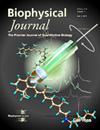机械敏感通道失活诱导可兴奋细胞的机械记忆。
IF 3.2
3区 生物学
Q2 BIOPHYSICS
引用次数: 0
摘要
最近的实验揭示了一个令人着迷的现象:可兴奋细胞表现出机械记忆,它们现在的兴奋行为强烈依赖于它们过去的机械经验。然而,这种现象的潜在机制仍然难以捉摸。在这里,我们介绍了一个机电框架,集成了机械细胞变形,机械敏感(MS)通道(如压电通道)的状态转换和跨膜离子通量。我们发现,MS通道失活产生一种历史依赖的激励动力学,其特征是随后的激活电流随着先前机械刺激的幅度、速度和持续时间的增加而逐渐下降。此外,在之前的刺激中,MS通道失活导致不应期,在此期间细胞不能在随后的机械刺激中引发新的动作电位。最后,我们发现由于MS通道失活,细胞可以适应先前的机械刺激,从而导致更高的激活阈值刺激。因此,MS通道失活有利于减少响应长时间和重复的机械刺激(“神经适应”)的放电活动,这可能保护神经元免受过度激活和损伤。然后,我们进行了两个虚拟实验来预测神经元机械特性的变化如何改变它们的兴奋行为。这些发现共同强调了MS通道失活在控制可兴奋细胞的机械记忆和神经适应中的关键作用,为机械力和细胞电反应之间复杂的相互作用提供了新的视角。本文章由计算机程序翻译,如有差异,请以英文原文为准。
Mechanical memory of excitable cells induced by mechanosensitive channel inactivation.
Recent experiments have unveiled a fascinating phenomenon: excitable cells exhibit mechanical memory, whereby their present excitation behaviours strongly depend on their past mechanical experiences. However, the underlying mechanism of this phenomenon remains elusive. Here, we introduce an electromechanical framework that integrates mechanical cell deformation, state transformations of mechanosensitive (MS) channels (such as Piezo channels), and transmembrane ion fluxes. We reveal that MS channel inactivation yields a history-dependent excitation dynamics, characterized by a progressive decline in subsequent activated currents with increasing amplitude, speed, and duration of prior mechanical stimuli. Moreover, MS channel inactivation in preceding stimulation results in a refractory period during which cells cannot elicit new action potentials upon subsequent mechanical stimuli. Finally, we show that cells can adapt to preceding mechanical stimulation due to inactivation of MS channels, resulting in a higher activated threshold stimulation. Thus, MS channel inactivation favors the reduction of firing activities in response to prolonged and repeated mechanical stimuli ("neural adaptation"), which may protect neurons against over-activation and damage. We then conduct two virtual experiments to predict how changes in mechanical properties of neurons modify their excitation behaviours. These findings together emphasize a critical role of MS channel inactivation in governing the mechanical memory and neural adaptation of excitable cells, shedding new light on the intricate interplay between mechanical forces and cellular electrical responses.
求助全文
通过发布文献求助,成功后即可免费获取论文全文。
去求助
来源期刊

Biophysical journal
生物-生物物理
CiteScore
6.10
自引率
5.90%
发文量
3090
审稿时长
2 months
期刊介绍:
BJ publishes original articles, letters, and perspectives on important problems in modern biophysics. The papers should be written so as to be of interest to a broad community of biophysicists. BJ welcomes experimental studies that employ quantitative physical approaches for the study of biological systems, including or spanning scales from molecule to whole organism. Experimental studies of a purely descriptive or phenomenological nature, with no theoretical or mechanistic underpinning, are not appropriate for publication in BJ. Theoretical studies should offer new insights into the understanding ofexperimental results or suggest new experimentally testable hypotheses. Articles reporting significant methodological or technological advances, which have potential to open new areas of biophysical investigation, are also suitable for publication in BJ. Papers describing improvements in accuracy or speed of existing methods or extra detail within methods described previously are not suitable for BJ.
 求助内容:
求助内容: 应助结果提醒方式:
应助结果提醒方式:


